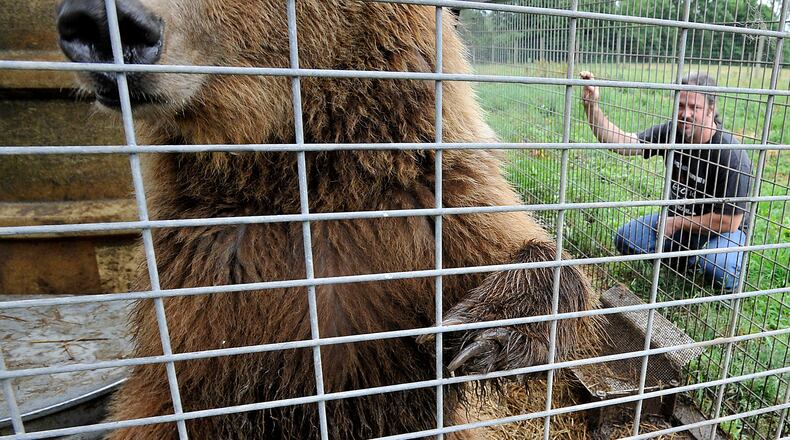State officials have been phasing in aspects of the Dangerous Wild Animal Act since Gov. John Kasich signed the bill in June 2012. The first phase went into effect Sept. 5, 2012, prohibiting the sale or purchase of dangerous wild animals, including lions, tigers and bears.
During a two-month registration period in late 2012, 150 owners — private citizens and zoos — registered a total of 888 dangerous wild animals, according to the Department of Agriculture.
Owners of registered dangerous wild animals began applying for a permit from the Department of Agriculture on Oct. 1. Failure to register disqualifies an owner from receiving a permit by today .
The state can seize the animals if owners are denied a permit or can’t meet the new requirements. As of Dec. 26, the state had received five complete permit applications and 25 incomplete permit applications.
“The law is pretty clear about the need to have a permit to keep these animals, the steps that need to be taken to get a permit and the timeline for taking those steps,” said Erica Hawkins, spokesperson for the Department of Agriculture.
Hawkins said the state will work with owners who want to be in compliance with the law, even if they did not register their animals.
“They need to reach out to us as soon as possible,” she said. “But the law is still the law. There’s limitations in what we’re able to do.”
Before the state law was established, there were no regulations for private citizens to own exotic animals, nor was there an inventory of exotics in the state.
Tim Harrison, the director of Outreach For Animals, a nonprofit exotic animal rescue organization, estimates that 90 percent of owners did not register their exotic animals. He said in Ohio, there are 1,000 to 1,500 lions, tigers, leopards and cougars, and about 1,000 bears.
His organization has moved 206 animals this year out of Ohio to sanctuaries across the country.
“There’s a bunch (of exotic animals in the state), and it’s really hard to guesstimate,” Harrison said. “There was no permit system or registration. There was a license for dogs, but nothing for these animals.”
Polly Britton, legislative agent for the Ohio Association of Animal Owners, said the new law will “shut down many of our members who are already federally-licensed as exhibitors or breeders.”
The OAAO has about 8,000 members — approximately half from Ohio. It also has members from other states who do business in Ohio.
“We were told all along there would be exemptions available for federally-licensed exhibitors, ” Britton said. “It’s not there.”
Seven owners, including four members of the OAAO, filed a lawsuit against the state last year but lost. An appeals hearing was held Nov. 22 in the U.S. Court of Appeals for the Sixth Circuit in Cincinnati. A decision has not yet been rendered.
“We did not want to file a lawsuit all along,” Britton said. “We know our people aren’t made of money. But it came down to that, or live with a bad law that nobody wants and the animals pay the price.”
Once the new law takes full effect, Hawkins said the state is anticipating discovering exotic animals that were not registered. The state urges citizens to call the Department of Agriculture at 855-392-6446 if they have concerns or suspect exotic animals are being kept unlawfully.
The state will send out an investigator to determine if the owner is in compliance with the law. The enforcement division has five investigators, Hawkins said.
Britton predicts state officials will show up on people’s doorsteps to inspect the animals, paperwork and equipment.
“If you don’t meet the requirements, I expect them to request that the animals be surrendered,” she said. “And if the owners don’t surrender, they’ll be taken to the court of common pleas.”
The state built a taxpayer-funded, $2.8 million, 20,000-square-foot temporary holding facility in Reynoldsburg on the Department of Agriculture's 150-acre campus property. Construction was completed at the end of February, and since it opened, there have been 28 exotic animals — 24 alligators, three bears and a cougar — that have stayed there.
Animals have stayed anywhere from one night to two weeks before being moved to a sanctuary, Hawkins said. She said the facility is currently occupied, but declined to reveal what animals are there.
The state legislation was sparked by an October 2011 Zanesville incident when Terry Thompson killed himself after setting free 56 jungle cats and other dangerous exotic animals in the Muskingum County countryside. Sheriff’s deputies killed 49 of the animals to prevent them from escaping into the community and harming citizens.
About the Author
